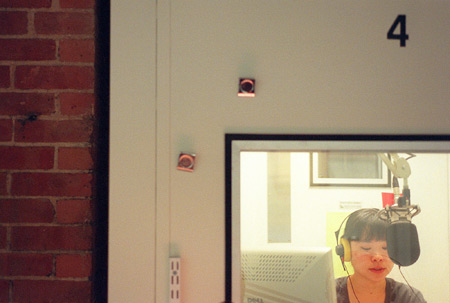Reading for the blind
Students volunteer to record books for blind and dyslexic

Michele Shirasu-Hiza sits in what looks like a phone booth with the lights on, talking to herself.
Were it any other place, the scene might seem weird and Shirasu-Hiza – a graduate student at Harvard Medical School – out of place. But in the basement of 28 Charles St. in Cambridge, it’s just another day at the office, recording textbooks for the blind.
Shirasu-Hiza is one of a handful of Harvard volunteers lending a hand at Reading for the Blind and Dyslexic, a private nonprofit organization whose mission is aptly described in its name. Blind and dyslexic students from across the nation need help reading their textbooks.
That help comes in the form of cassette tapes created by volunteers who log long hours in the recording booth, reading word-for-word the latest texts: contents, appendices, page numbers, chapter headings, and all the words in between.
“There’s a great energy there,” Shirasu-Hiza said. “I have a couple of good friends who are dyslexic. One didn’t know he was dyslexic until he was in college. It takes him three times as long to read something as anyone else.”
Nationwide network
Reading for the Blind and Dyslexic is part of a nationwide network of 32 organizations, directed from Princeton, N.J., that divvies up important texts and hands them to volunteers to tape. The tapes are then distributed across the country to blind and dyslexic people who need them.
“There’s a huge need. We can’t possibly keep up with the demand for this product,” said studio director Ted Washburn ’64, who coached Harvard’s freshman crew for 23 years before leaving in 1988.
The Cambridge office has about 200 to 250 active volunteers, including a number of Harvard staff and students. Washburn said the main goal for the organization’s staff is to make the experience of the volunteers as easy and fun as possible. If the volunteers are happy, he said, the taping will take care of itself.
“We read the latest of the latest. It’s a performance book club,” Washburn said. “Our whole schtick in here is how to make sure this is the most exciting [part of the day], the highlight of the day. If we can do that, the service will take care of itself.”
So far, that strategy has been working, Washburn said. The Cambridge office of Recording for the Blind and Dyslexic, though just one of 32 offices nationwide, accounts for about 35 percent of the organization’s gross output.
“We’re producing tapes here six times faster than any other studio,” Washburn said.
Volunteers are put through an initial orientation and then trained at how to work the recording equipment. Once trained, they can schedule a two-hour session at their convenience. When they come in, they read a variety of textbooks, from basic textbooks for school children to graduate-level scientific texts.
Because today’s textbooks often contain charts, diagrams, and separate boxes exploring subtopics, the organization’s staff marks books before handing them to volunteers. The volunteers follow the marks so that information outside the main text is inserted in the most logical places. As they go, the volunteers insert recording marks so that the recording is searchable by chapter and heading. That way the user can advance or go back to highlight or review certain topics.
The organization is slowly shifting to a digital format, which will make the recordings even more searchable.
Giving something back
Volunteers are driven to give something back to society and don’t necessarily have personal experience with the blind and dyslexic, according to Volunteer Coordinator Peggy Loeb.
Cheryl Cheney, a Harvard employee who works as a laboratory administrative coordinator in the Biology Labs, said she has wanted to volunteer in the past, but this is the first time she’s felt she has the time. Volunteering, she said, makes life more meaningful.
“All in all, it’s been very positive. The people organizing it have been very friendly and helpful,” Cheney said.
Alison Scott, Warren Bibliographer for American History, has been volunteering since June. She said she has three brothers who are dyslexic and so understands the problem. So far, she said, she’s recorded junior high and high school literary textbooks, as well as a history of Africa.
“It is something that I felt I understood that I could contribute to in a meaningful way,” Scott said. “It’s been challenging and interesting.”




